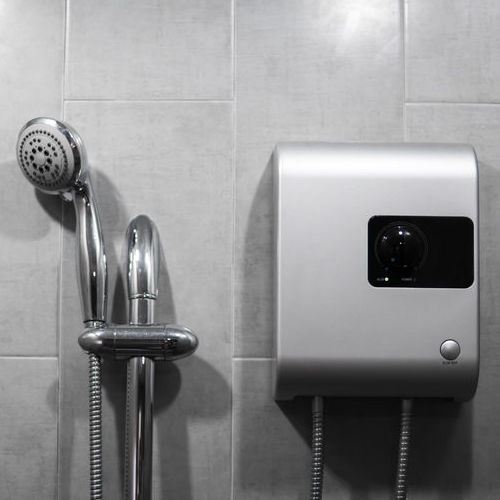What are the advantages and disadvantages of a tankless water heater?
Thinking about installing a tankless water heater in your home? If so, you’ve heard tankless systems produce hot water on demand and you’ll never run out of hot water. Unlimited hot water probably generated your interest in tankless systems. These are all good reasons to invest in a tankless system. But, is a tankless system really worth it? Are all the things said about them true. Before you choose one, you need to weigh their advantages and disadvantages. Make sure they fit your needs and your budget.
Advantages
- Produces instant hot water: Delivers its supply of hot water almost instantly after all cold water is flushed from pipes, so the hot water never runs out.
- Lasts longer and have longer warranties: Standard tank systems last about 10 years. A tankless system lasts about twice that time. Warranties usually extend to 20 years.
- Lowers monthly costs: These systems are 22% more efficient than tank systems and reduce your monthly utility costs. This will add up to long-term savings.
- Saves on space: The smaller units require little space and can be installed almost anywhere, even on walls.
- Qualifies for tax credits: Installation costs are offset by federal tax credits.
Disadvantages
- Temperatures are not consistent: While hot water comes out instantly, the temperature isn’t always consistent.
- High installation costs: Tankless systems cost more to install initially. Added expenses like gas line rerouting or equipment like water softeners might cause installation costs to go up.
- High demand can overwhelm the system: When there is heavy demand, especially larger households, the system can be overwhelmed and not work as efficiently. These systems work best with moderate demand and in smaller homes.
If you are interested in Tankless water heater installation in Fort Worth, TX, you can always rely on the experts at Molberg Plumbing LLC. Reach out to us at (817) 476-9963 to find out how we can help meet all your plumbing needs.
Which is better hot water heater or tankless?
Both standard tank and tankless water heaters have their pros and cons. Your household’s demand for hot water tends to be the determining factor in selecting one over the other. Typically, if you are using 41 gallons or less of hot water each day, a tankless system is probably a good choice to make, especially if you have a smaller home with limited space. In this case, a tankless system can save you anywhere from 22% to 34% on utility costs. Of course, with newer energy-efficient tank systems like high-recovery water heaters, when you have high demand, you can get just as many benefits as from a tankless system. Tankless systems are also useful as supplementary resources of hot water.
Are tankless water heaters more efficient?
Generally, tankless water heaters are more efficient than standard tank water heaters. That efficiency can be lost, however, when there is high demand. In fact, a tankless system can get overwhelmed when demand is heavy. There are also several types of high-efficiency tank water heaters on the market today that run just as efficiently as tankless.
What tankless water heater do I need?
Like regular water heaters, tankless water heaters come in various sizes. The type you’ll need will primarily depend on the size of your household and how much hot water is used. You can usually check the rate of gallons per minute (GPM) on a unit to determine if it is right for you. Most tankless systems produce around 2 GPM to 12 GPM and average households typically require anywhere from 5 GPM to 10 GPM to meet demands. Smaller tankless units are sometimes installed as a way to supplement the tank’s supply.
Where is tankless water heater installed?
Because of their small size, tankless water heaters can be installed almost anywhere, although the closer they are to the appliances or faucets they are supplying, the more efficient they will be. Tankless units are often installed on walls near those appliances or faucets. Gas units also need to be close to areas where they are vented sufficiently. Can a tankless water heater be installed outside? Both gas and electric units can be installed outside. Some gas units are specifically designed to be installed outside to meet ventilation requirements. Electric units or gas units not specifically made for outside use will need some kind of shelter or covering to protect them from the elements.
Can you run out of hot water with a tankless water heater?
Technically, no, a tankless water heater doesn’t run out of hot water, because there is no supply in a tank being heated. The water is heated as needed. You can, however, have instances when the hot water gets cold. You might, for example, get a splash of cold water from your shower when you first turn on the hot water. This is just leftover cold water in the pipes. It’s rarely a cause for alarm. Moreover, when demand is high on a tankless system, the unit can get overwhelmed. This can happen when more than one tap or appliance is in use at the same time.
Can a tankless water heater fill a tub?
If you’ve been looking forward to a hot bath all day and you’re ready to fill your tub from your tankless water heater, you may be waiting longer than expected for your bath. This all depends on the size of the tankless unit and the tub. The smaller the unit, the longer it will take to fill a large tub.

Call Us Today
When you are looking to install a tankless water heater in Fort Worth, TX, you can always count on the expertise of Molberg Plumbing LLC. We offer a full range of plumbing services including water heater installation. Book a service call today at (817) 476-9963.
